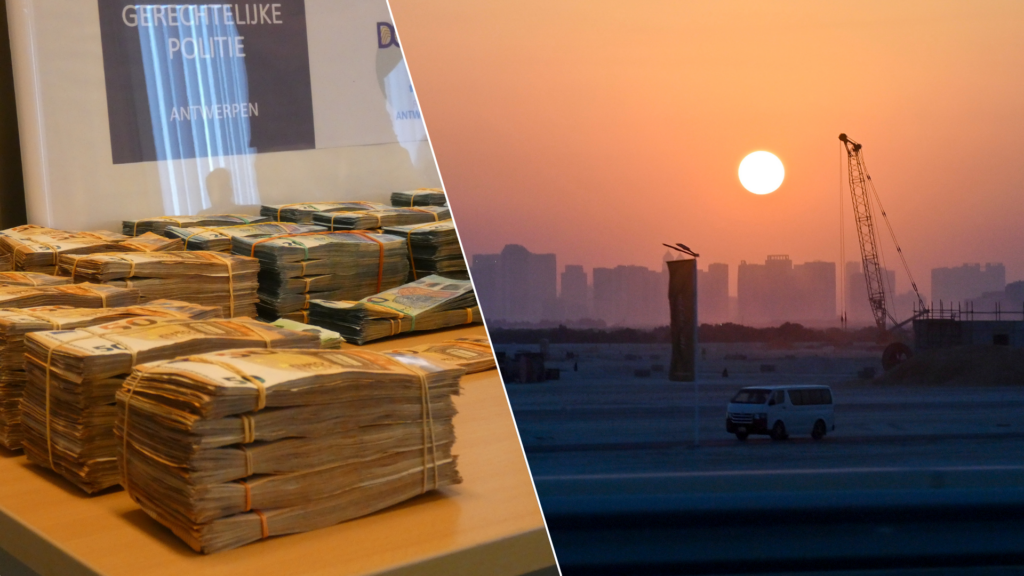Several leaders of drug gangs have been able to buy, rent and sell villas and flats in Dubai in recent years, making hefty profits, despite being wanted, prosecuted or even convicted by Belgian law enforcement agencies.
Dubai is not only known as a hideout for criminals; the city in the United Arab Emirates (UAE) is also a real estate haven for these offenders, including people leading drug trafficking operations. For years now, drug bosses, including people sought by Belgium, have been making millions in profit through luxurious real estate undisturbed, "Dubai Unlocked", an investigation by several news organisations including De Tijd, revealed on Tuesday.
Based on a slew of leaked real estate data from Dubai, journalists uncovered that these criminals were able to invest in luxurious properties for years, pocketing generous capital gains in the process. The first purchase dates back to 2011, but most other transactions happened in recent years.
An analysis of the data confirms that 53 properties in the Emirati city have been purchased in recent years by ten fugitive drug bosses (and four of their relatives) running cocaine trafficking operations. The criminals involved have already been prosecuted by the Belgian justice system for drug-related offences, and six of these fugitives have even been convicted (in absentia) in Belgium.
Top criminals wanted by Belgium
Five of them are on the current list of extradition requests, while only one person who came up in the leaked property records, Franc G., has been extradited to Belgium. He is allegedly suspected of ordering the execution of an Albanian man who was shot in Molenbeek with a machine gun in broad daylight in November 2020. The killing reportedly involved settlements between Albanian drug clans. The leaked property details link him to as many as 10 properties in Dubai, but all of them have been sold.
Another criminal, 32-year-old Dutchman Joseph L., also known as Bolle Jos, who is one of Europe's most wanted criminals, also turned up in the leaked data. In February this year, a Belgian court sentenced him to 12 years in prison for leading a criminal organisation that used a kebab shop in Genk as a cover to import large quantities of cocaine from Brazil and Ecuador. He is also being prosecuted in other Belgian drug cases.
Three criminals whose names were included in the leaked files are also on the US Office of Foreign Assets Control sanctions list at Belgium's request.
One of the best-known Belgian names in the leaked data is Othman E.B. (36), an Antwerp man wanted by Belgian prosecutors for years on suspicion of cocaine smuggling. In June he is due to appear before the Antwerp court. Between 2013 and 2015, Othman E.B. bought as many as 13 properties, totalling €8.5 million. Five flats and two villas were rented out, accounting for at least €360,000 in rental income.
Property worth €56 million
On average, drug criminals or their relatives paid almost €1 million per property, with the cheapest costing around €216,000 and the most expensive more than €5 million. Now, these 53 properties – 44 flats, five villas, three plots of land and an office in Dubai – can reportedly be valued at €56 million.
Some of the properties (at least 29) were also rented out, among others to Jordanians, British, French, Serbs, Romanians, Russians and a Syrian, Turk, Indian, Italian and American, through which the criminals collected nearly €3 million in rental income.
Swedish television SVT revealed just how easily criminals can enter the real estate market in Dubai. A salesperson from a leading property development company in the city told them bluntly that they could buy a particular flat with 'bags of cash' or crypto coins, and that they would be asked 'zero questions' about the origin of the money.
Justice Minister Paul Van Tigchelt (Open VLD) said in response to the investigation that he had flown to Abu Dhabi in mid-March to meet his colleague from the United Arab Emirates. Among other things, the seizure of assets (property confiscation) was discussed, a new stage in cooperation between the two countries.
In February this year, the UAE implemented stricter anti-money laundering rules now apply and real estate agents are more likely to be fined if they break the rules. "We take our role in protecting the integrity of the global financial system extremely seriously," a UAE response to the investigation read. "We are working closely with international partners to disrupt and deter all forms of illicit financing."
However, corruption experts have argued the Dubai property market has not yet changed substantially and many agents are still not declaring property deals. Buyers can still hide behind trusts, holding companies and foundations.

